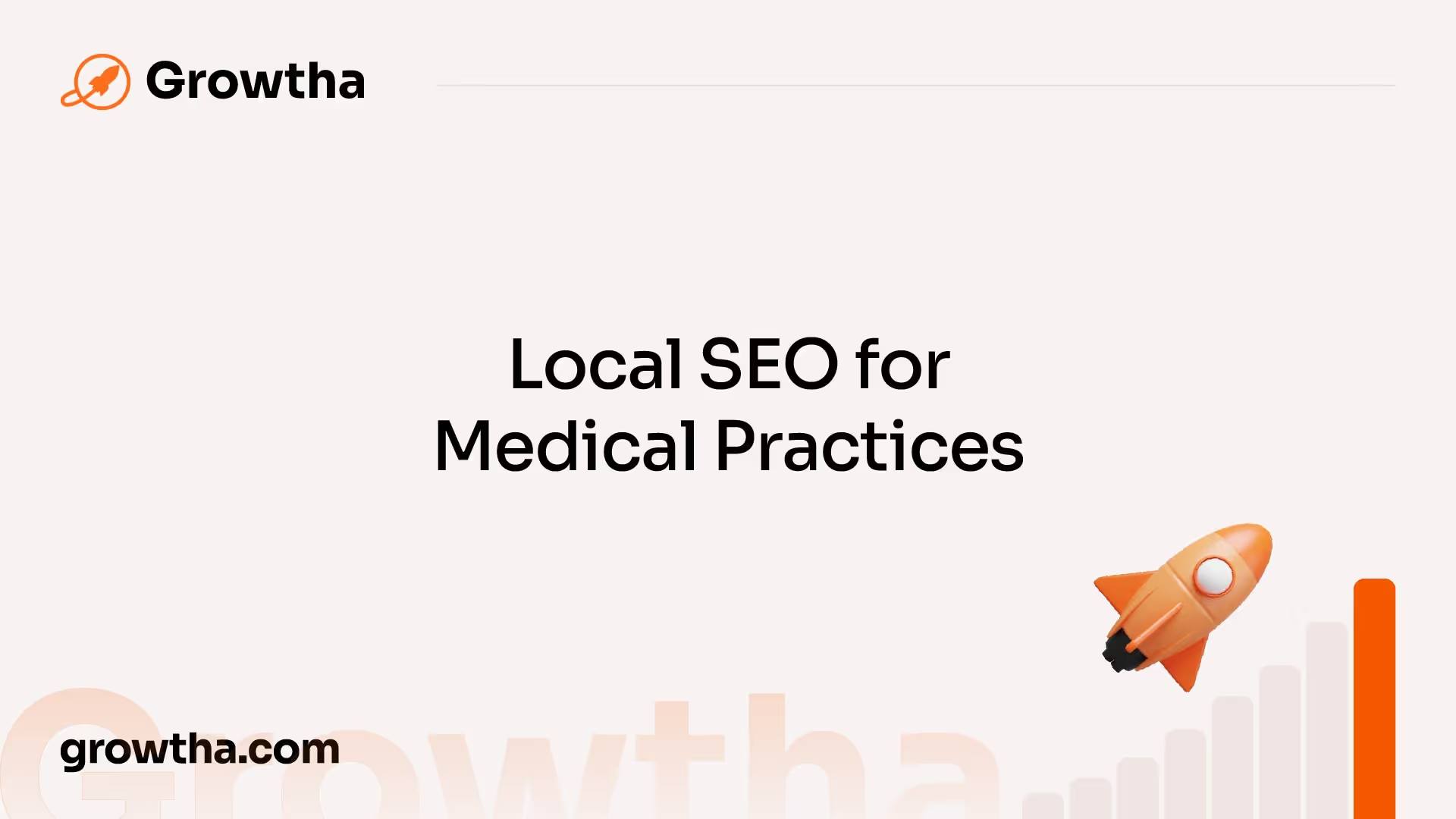Stay Ahead with Cutting-Edge Medical SEO Services
Medical SEO involves a set of techniques and practices aimed at enhancing a medical practice's online presence and making it more discoverable to patients searching for healthcare


Stay Ahead with Cutting-Edge Medical SEO Services
Understanding Medical SEO

In the digital age, it's essential for medical practices to have a strong online presence. One of the key strategies to achieve this is through Medical SEO, which stands for Search Engine Optimization. By optimizing their websites, medical practices can improve their visibility and rankings on search engine results pages, ultimately attracting more potential patients.
Basics of SEO for Healthcare
Medical SEO involves a set of techniques and practices aimed at enhancing a medical practice's online presence and making it more discoverable to patients searching for healthcare services. When patients search for medical practices, they tend to contact the top options they find on search engines like Google or Bing [1]. Therefore, ranking at the top of search engine results pages is crucial for medical practices to capture the attention of potential patients.
To achieve this, medical practices need to implement various SEO strategies. This includes targeting specific keywords and phrases that potential patients are likely to search for when looking for medical services. By optimizing their website content to align with these keywords, medical practices can drive relevant traffic to their website and connect with potential patients in their area [1].
Importance of Medical SEO
Medical SEO is important for several reasons. Firstly, it helps medical practices rank higher on search engine results pages, increasing their visibility and making it more likely for potential patients to click on their website. By targeting specific keywords such as "best family doctor in [city]" or "professional healthcare services in [city]," medical practices can attract patients who are actively searching for the services they offer [1].
Secondly, medical SEO is a cost-effective marketing strategy. By utilizing SEO techniques, medical practices can reduce their reliance on expensive traditional advertising methods such as radio or television ads. Instead, they can drive organic traffic to their website through specific search queries, ultimately saving valuable resources and time for both the practitioner and the patient [2].
Lastly, medical SEO allows medical practices to tailor their online presence to their target audience. By curating content that matches the search terms and phrases potential patients use, medical practices can ensure that patients find the exact services they are looking for online. This not only increases the likelihood of attracting the right patients but also saves valuable resources and time by reducing the risk of connecting with patients who may not fit the practice's offerings [2].
In summary, medical SEO plays a vital role in helping medical practices increase their online visibility, attract targeted traffic, and effectively connect with potential patients. By implementing SEO strategies and optimizing their website content, medical practices can stay ahead of the competition and thrive in the digital landscape of healthcare marketing.
Implementing SEO Strategies

To effectively utilize SEO for healthcare marketing, it is important to implement specific strategies that target relevant keywords, optimize for local search, and create valuable content.
Keyword Targeting in Healthcare
Keyword targeting is a crucial aspect of medical SEO services. By identifying and optimizing for specific keywords related to medical services, practices can drive relevant traffic to their website and connect with potential patients in their area. For example, targeting keywords like "best family doctor in [city]" and "professional healthcare services in [city]" can help medical practices attract local patients who are actively searching for the services they offer.
It is important to conduct thorough keyword research to identify the most relevant and valuable keywords for your medical practice. This involves understanding the search intent of your target audience and identifying keywords that have a good balance of search volume and competition. By strategically incorporating these keywords into your website content, meta tags, and headings, you can improve your search engine rankings and attract more qualified traffic.
Local SEO for Medical Practices

Local SEO plays a vital role in the success of medical practices. Incorporating geographical locations within keywords and phrases helps medical practices attract local patients who are actively seeking healthcare services in their area. This involves optimizing your website content, meta tags, and business listings with location-specific information. By tailoring your SEO strategy to the target audience in your locality, you can improve your visibility in local search results and increase the likelihood of patients clicking on your website and booking appointments.
To enhance your local SEO efforts, it is important to claim and optimize your Google My Business listing. This includes providing accurate and up-to-date information about your practice, such as your address, phone number, and business hours. Encouraging patients to leave reviews on your listing can also boost your local visibility and credibility.
Content Creation for SEO
Content creation is a fundamental component of healthcare SEO strategies. Producing high-quality and relevant content helps improve search engine rankings for medical practices. Regularly publishing new content signals to search engines that your website is active and authoritative, which can positively impact your rankings. Creating valuable content in various forms, such as blog posts, white papers, webpages, and case studies, can establish your expertise and attract patients who are searching for specific healthcare information [3].
When creating content for SEO, it is important to focus on providing valuable information to your target audience. Avoid keyword stuffing and instead, naturally incorporate relevant keywords into your content. This will help search engines understand the relevance of your content to specific search queries. Additionally, optimizing your content with visually appealing elements, subheadings, and bullet points can improve reader engagement and overall user experience.
By implementing effective SEO strategies, including keyword targeting, local SEO optimization, and content creation, medical practices can enhance their online visibility, attract targeted traffic, and establish a strong online presence in the competitive healthcare industry.
Benefits of Medical SEO

Implementing effective medical SEO strategies can provide numerous benefits for healthcare practices. By optimizing their online presence, medical practices can achieve increased visibility, attract targeted traffic, and benefit from cost-effective marketing.
Increased Visibility and Rankings
In today's digital age, patients rely heavily on search engines like Google or Bing when searching for medical practices. It's crucial for medical practices to appear at the top of search engine results pages (SERPs) to capture patient attention and drive website traffic [1]. A solid medical SEO strategy significantly enhances visibility, helping practices rank higher in SERPs [2].
With the right SEO techniques, medical practices can optimize their website content, metadata, and other elements to align with relevant keywords in their industry. By targeting specific keywords like "best family doctor in [city]" or "professional healthcare services in [city]," medical practices can increase their chances of appearing in the top search results for those specific queries. This increased visibility improves the likelihood of patients clicking on the website and booking appointments.
Attracting Targeted Traffic
One of the key advantages of medical SEO is the ability to attract targeted traffic to a medical practice's website. By tailoring SEO strategies to the target audience, medical practices can ensure that patients searching for specific medical conditions, treatments, or services find their website. This approach minimizes the risk of connecting with patients who may not fit the practice's offerings, saving valuable resources and time for both the practitioner and the patient [2].
Targeted traffic helps medical practices reach individuals actively seeking their services, increasing the likelihood of converting website visitors into patients. By providing informative and engaging content that addresses patients' needs and concerns, medical practices can establish themselves as trusted authorities in their field.
Cost-Effective Marketing
Utilizing medical SEO can be a cost-effective marketing strategy for healthcare practices. By driving organic traffic to their website, medical practices reduce the need for expensive traditional advertising methods like radio or television ads. SEO allows practices to reach potential patients online through specific queries, effectively targeting the right individuals without incurring high advertising costs.
Investing in medical SEO services yields long-term benefits for healthcare providers. Once a website has achieved a strong SEO foundation, ongoing maintenance and optimization efforts can be more cost-effective compared to other marketing strategies. By consistently monitoring and adjusting SEO tactics, medical practices can stay ahead of the competition and continue attracting patients online.
In summary, medical SEO provides significant benefits for healthcare practices. Increased visibility and rankings on search engines, attracting targeted traffic, and cost-effective marketing are just a few of the advantages. By implementing effective medical SEO strategies, healthcare practices can optimize their online presence, connect with potential patients, and ultimately grow their practice.
Technical Aspects of Healthcare SEO

To effectively optimize a healthcare website for search engines, it's essential to pay attention to the technical aspects of SEO. Two key areas to focus on are site architecture and navigation, as well as implementing schema markup and structured data.
Site Architecture and Navigation
Proper site architecture is vital for achieving maximum organic search optimization. An issue commonly found on healthcare websites is the lack of site architecture, which impacts the organization of content and navigation, hindering SEO performance. A well-structured website allows search engines to crawl and index pages efficiently, improving overall visibility.
When designing the site architecture, consider creating key landing pages that cover essential information, such as location pages, service pages, and about us pages. Missing these key landing pages can negatively affect user experience (UX) and SEO performance [5]. Conducting a technical SEO audit can help identify and address any missing pages, ensuring a comprehensive website structure.
Schema Markup and Structured Data
Implementing schema markup and structured data is crucial for healthcare websites. Schema markup provides additional information to search engines, helping them understand the content and context of webpages. It can enhance search engine understanding of healthcare-related information and improve the visibility of search results [5].
Medical-related schema markup is often lacking in healthcare websites, which is a common technical SEO issue. By implementing health and medical schema or structured data markup, healthcare websites can enhance search engine visibility and potentially boost user engagement and rankings. This markup allows search engines to present more informative and visually appealing results, which can increase the click-through rate [5].
By focusing on site architecture and navigation, as well as implementing schema markup and structured data, healthcare websites can optimize their technical SEO. These strategies improve the organization and accessibility of the website's content, allowing search engines to better understand and rank the site. By addressing these technical aspects, healthcare providers can enhance their online visibility and attract more relevant traffic to their websites.
Overcoming Challenges in Healthcare SEO
When it comes to healthcare SEO, there are specific challenges that professionals in the field must navigate in order to optimize their online presence. In this section, we will discuss three common challenges: dealing with medical jargon, building patient trust, and navigating privacy regulations.
Dealing with Medical Jargon
One of the biggest hurdles in healthcare SEO is dealing with medical jargon. The healthcare industry is filled with complex terms and terminology that can be difficult for the average person to understand [6]. When creating content for healthcare websites, it's crucial to strike a balance between using medical terminology to maintain credibility and ensuring that the content remains accessible to a wider audience.
To overcome this challenge, healthcare SEO professionals should consider using layman's terms whenever possible. By explaining medical concepts in a simplified manner, they can make the content more understandable and engaging for a broader audience. It's also important to conduct keyword research to identify commonly used terms and phrases that patients may use when searching for healthcare information. This helps to optimize content and improve its visibility in search engine results.
Building Patient Trust
Building patient trust is a critical aspect of healthcare SEO. In the digital age, patients rely on online resources to find healthcare providers and make informed decisions about their medical care [6]. To establish trust, healthcare websites must exude confidence, empathy, and reliability.
To overcome this challenge, healthcare SEO professionals should focus on creating high-quality, accurate, and authoritative content. Content should address common patient concerns, provide helpful information, and showcase the expertise of the healthcare providers or organizations. Including patient testimonials or success stories can also contribute to building trust. Additionally, optimizing the website with clear contact information, professional credentials, and certifications can further enhance credibility and reassure patients.
Navigating Privacy Regulations
Healthcare SEO professionals must navigate strict privacy and compliance regulations while trying to reach their target audience [6]. Protecting patient privacy and complying with regulations such as HIPAA (Health Insurance Portability and Accountability Act) is of utmost importance.
To overcome this challenge, healthcare SEO professionals should ensure that their website and online platforms are secure and compliant with privacy regulations. This includes implementing secure data transmission (HTTPS), using encrypted forms for collecting patient information, and obtaining patient consent for any data collection or sharing. Regularly auditing the website and conducting risk assessments can help identify and address any potential privacy vulnerabilities.
By addressing the challenges of dealing with medical jargon, building patient trust, and navigating privacy regulations, healthcare SEO professionals can optimize their online presence and effectively connect with their target audience. By providing valuable and trustworthy information while maintaining compliance, healthcare organizations can enhance their visibility, credibility, and ultimately attract more patients.
Best Practices in Healthcare SEO
To achieve success in healthcare SEO, it is important to follow best practices that can enhance your online visibility and improve search engine rankings. Consistent blogging and content sharing, quality link building, and balancing compliance with audience engagement are key aspects to focus on.
Consistent Blogging and Content Sharing
Consistently creating and sharing valuable content is a fundamental aspect of healthcare SEO. Regularly publishing fresh and optimized blog posts helps to maintain relevance in the eyes of search engines. It is crucial to focus on creating understandable, valuable, concise, and visually appealing content in various forms such as blog posts, white papers, webpages, and case studies [3].
Sharing your blog posts and linking to the content on social media platforms like Facebook and Twitter can drive traffic to your website and improve SEO rankings. By leveraging social media channels, you can expand your reach and engage with a wider audience, increasing the visibility and credibility of your healthcare brand.
Quality Link Building
Link building plays a vital role in healthcare SEO. Search engines assess the quality of pages by analyzing the popularity and number of links leading to them. It is crucial to focus on quality rather than quantity when it comes to link building. Building high-quality backlinks from reputable sources can significantly improve your website's credibility and search engine rankings.
Utilize social media channels and blogs to link back to your website. By sharing valuable and relevant content, you can attract links from other reputable websites, further establishing your authority in the healthcare field. Similarly, removing spammy or low-quality links is essential to maintain credibility with search engines and avoid any negative impact on your SEO efforts.
Balancing Compliance and Audience Engagement
The healthcare industry faces unique challenges in SEO, particularly in finding a balance between compliance and audience engagement. It is essential to navigate privacy regulations and maintain patient confidentiality while still providing valuable information and engaging with your target audience.
To strike this balance, focus on creating content that is informative, engaging, and accessible to a wide range of readers. Avoid using excessive technical jargon that may alienate your audience. Instead, aim for clear and concise language that effectively communicates your message. By presenting information in a user-friendly manner, you can build trust with your audience and establish your healthcare brand as a reliable source of information.
By following these best practices in healthcare SEO, you can enhance your online presence, attract targeted traffic, and stay ahead of your competition. Remember to consistently create valuable content, build high-quality backlinks, and strike the right balance between compliance and audience engagement to effectively optimize your healthcare website for search engines.
References
[1]: https://seo.ai/blog/seo-for-medical-practices
[2]: https://www.snapagency.com/4-reasons-your-medical-practice-needs-seo-services/
[3]: https://pyxl.com/blog/seo-strategy/
[4]: https://digitalismedical.com/blog/healthcare-seo-strategy/
[5]: https://healthcaresuccess.com/blog/healthcare-marketing/these-7-technical-seo-problems-can-cripple-your-websites-visibility-on-google.html
[6]: https://www.linkedin.com/pulse/what-common-seo-challenges-healthcare-often-meet-saikat-mazumder-ro8fc?trk=article-ssr-frontend-pulsemore-articlesrelated-content-card







